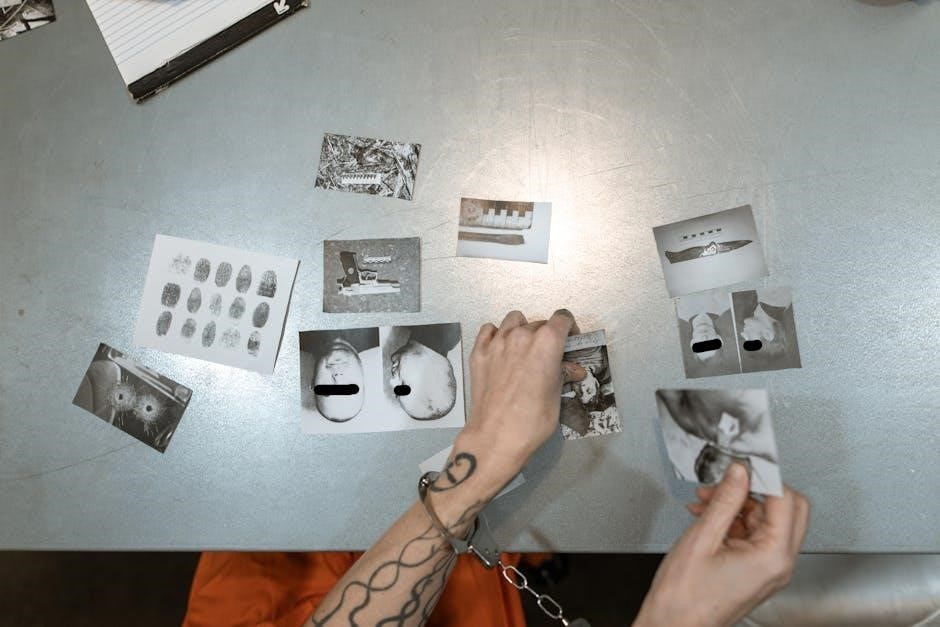Cross-examination is a critical component of criminal trials, allowing attorneys to challenge witnesses and uncover inconsistencies. It ensures accountability and fairness, making it a cornerstone of justice.
Overview of Cross-Examination
Cross-examination is a cornerstone of criminal trials, enabling attorneys to scrutinize witnesses, challenge testimonies, and reveal discrepancies. It involves strategic questioning to undermine credibility and present alternative narratives. The process requires meticulous preparation, focusing on key evidence and prior statements. Effective cross-examination balances aggression with precision, ensuring fairness while uncovering truths. Its primary aim is to influence jury perceptions and sway trial outcomes, making it a vital skill for criminal defense and prosecution.
Importance of Cross-Examination in Criminal Trials
Cross-examination is essential in criminal trials as it tests the credibility and reliability of witnesses. It ensures fairness by allowing both prosecution and defense to challenge evidence and testimonies. This process reveals inconsistencies, helping jurors and judges assess the truth. Effective cross-examination can significantly influence trial outcomes, making it a cornerstone of criminal justice. Its absence could lead to unjust verdicts, underscoring its critical role in maintaining the integrity of legal proceedings.
Key Elements of Effective Cross-Examination
Effective cross-examination relies on thorough preparation, clear questioning, and strategic use of evidence to challenge witness credibility and control the narrative in criminal cases.
Strategies for Cross-Examination
Effective cross-examination strategies involve thorough preparation, controlling the narrative, and using evidence to challenge credibility. Attorneys should focus on key points, ask leading questions, and anticipate responses. Staying calm and adaptable is crucial, as is avoiding unnecessary conflicts. Using prior statements and physical evidence can undermine witness reliability. A well-planned approach ensures clarity and precision, maximizing the impact of each question to achieve favorable outcomes in criminal cases.
Techniques to Challenge Witness Credibility
Challenging witness credibility often involves highlighting inconsistencies in their testimony, using prior statements or evidence to contradict their claims. Attorneys may employ psychological tactics, such as questioning the witness’s motive or memory reliability. Presenting physical evidence or documentary proof can also undermine credibility. Additionally, focusing on the witness’s demeanor and potential biases helps cast doubt. These methods require meticulous preparation and strategic questioning to effectively discredit the witness’s reliability.

Types of Questions in Cross-Examination
Cross-examination employs leading, open-ended, and follow-up questions to elicit specific responses, challenge testimony, and uncover inconsistencies, each serving distinct purposes in shaping the narrative.
Leading Questions
Leading questions in cross-examination are phrased to suggest a specific answer, often beginning with “Isn’t it true…” or “Wouldn’t you agree…”. They are powerful tools for attorneys to guide witnesses toward desired responses, challenge testimony, and highlight inconsistencies. Effective use of leading questions requires careful preparation and a clear understanding of the witness’s prior statements. They are particularly useful for controlling the narrative and limiting the witness’s ability to elaborate, making them a cornerstone of strategic cross-examination techniques.
Open-Ended Questions
Open-ended questions in cross-examination encourage detailed responses, allowing attorneys to uncover new information or expose inconsistencies. They often begin with “what,” “how,” or “why,” prompting witnesses to elaborate. Unlike leading questions, open-ended queries do not suggest specific answers, giving the witness more freedom to explain. This approach can reveal credibility issues or uncover facts beneficial to the case, making it a valuable tool for probing testimony and gathering evidence during cross-examination.
Follow-Up Questions
Follow-up questions are essential in cross-examination to delve deeper into witness testimony, clarifying ambiguities or challenging credibility. They often arise from previous answers, allowing attorneys to probe further into inconsistencies or critical points. Strategic use of follow-up questions can reveal new information, undermine a witness’s reliability, or strengthen the defense’s position. Effective follow-up questioning requires active listening and quick thinking to address evolving testimony and maximize its impact during the trial.

The Role of Evidence in Cross-Examination
Evidence plays a pivotal role in cross-examination, enabling attorneys to challenge witness testimonies and strengthen their cases; Physical and documentary evidence are often used to discredit statements.
Using Physical Evidence
Physical evidence is a powerful tool in cross-examination, allowing attorneys to challenge witness credibility by presenting tangible items. For example, forensic evidence like DNA or fingerprints can contradict testimony. Attorneys use such evidence to highlight inconsistencies, proving a witness’s account unreliable. Proper presentation of physical evidence requires strategic questioning, ensuring it aligns with the case’s facts. This approach strengthens the defense’s position, making it a cornerstone of effective cross-examination strategies in criminal trials.
Presenting Documentary Evidence
Documentary evidence, such as contracts, records, or communications, is vital in cross-examination. Attorneys use these documents to confront witnesses with written proof, exposing discrepancies in their testimony. For instance, a contradictory statement in an email can undermine a witness’s credibility. Effective presentation involves clear, focused questions that directly tie the document to the witness’s prior statements, creating a compelling narrative for the jury and strengthening the case’s foundation.
Common Mistakes to Avoid During Cross-Examination
Over-preparing questions can lead to inflexibility during cross-examination, preventing attorneys from adapting to unexpected witness responses and losing critical opportunities to challenge testimony effectively.
Over-Preparation of Questions
Over-preparing questions can lead to inflexibility during cross-examination, as attorneys may adhere too rigidly to a script, missing opportunities to adapt to unexpected witness responses. This rigidity can prevent effective challenges to testimony, undermining the attorney’s ability to uncover inconsistencies or discredit witnesses. Additionally, over-prepared questions may appear rehearsed, reducing their impact and potentially undermining the attorney’s credibility. courts have highlighted the importance of balancing preparation with adaptability to ensure effective cross-examination.
Failure to Listen to Witness Responses
Failing to listen attentively to witness responses is a critical error, as it prevents attorneys from seizing opportunities to challenge contradictions or inconsistencies. Witnesses may inadvertently reveal new information or weaknesses in their testimony, which, if unnoticed, can undermine the case. Courts have emphasized that active listening is essential for effective cross-examination, enabling attorneys to adapt their strategy dynamically and ensure the credibility of their arguments. This oversight can significantly impact trial outcomes.

Case Studies and Examples
High-profile criminal cases often highlight the effectiveness of cross-examination strategies, offering valuable insights into how targeted questioning can influence trial outcomes and uncover critical truths.
High-Profile Criminal Cases
Notable criminal cases, such as those involving high-stakes trials, demonstrate the pivotal role of cross-examination in shaping outcomes. These cases often involve meticulous preparation of over 4000 questions, ensuring every detail is scrutinized. The strategic use of leading and open-ended questions in these trials highlights the importance of challenging witness credibility and presenting evidence effectively. Such cases provide valuable insights into the art of cross-examination and its impact on justice;
Lessons Learned from Successful Cross-Examinations
Mastery of cross-examination is vital for criminal cases, as seen in high-profile trials. Key lessons include meticulous preparation, anticipating defense strategies, and effectively using evidence. Professionalism and adaptability are crucial, ensuring questions are strategic and impactful. Resources like 4000 cross-examination questions provide comprehensive insights, helping attorneys refine their techniques and achieve successful outcomes in court.
Ethical Considerations in Cross-Examination

Cross-examination must balance aggressive questioning with ethical boundaries, ensuring fairness and respect for witnesses. Attorneys must avoid misleading questions and maintain professionalism, upholding legal and moral standards;
Boundaries of Aggressive Questioning
Aggressive questioning in cross-examination must not cross ethical or legal boundaries. Attorneys must avoid badgering witnesses or asking misleading questions. Courts set limits to prevent harassment or unfair tactics, ensuring fairness. Overly aggressive methods risk judicial intervention or appeals. The line between zealous advocacy and misconduct is critical, requiring balance to maintain integrity and respect for the legal process while effectively challenging witness credibility.
Maintaining Professionalism

Maintaining professionalism during cross-examination is essential for credibility. Attorneys must avoid personal attacks and focus on facts. Respectful demeanor, even in adversarial settings, fosters trust with the court. Professionalism ensures a fair trial and upholds legal standards, preserving the integrity of the justice system while effectively challenging evidence and testimony. It balances advocacy with ethical conduct, crucial for a fair and just outcome in criminal cases.

Impact of Cross-Examination on Trial Outcomes
Cross-examination significantly influences trial outcomes by challenging evidence and shaping jury perceptions. Effective questioning can weaken opposing arguments, strengthening your case and potentially altering verdicts in criminal proceedings.
Influencing Jury Perceptions
Cross-examination plays a pivotal role in shaping jury perceptions by challenging witness credibility and highlighting inconsistencies. Strategic questioning can alter jurors’ views on evidence, potentially swaying their interpretation of facts. Effective cross-examination techniques, such as leading questions and evidence presentation, can undermine the prosecution’s case, creating reasonable doubt. This influence is crucial, as jurors’ perceptions often dictate trial outcomes, making cross-examination a powerful tool in criminal defense strategies.
Swaying the Judge’s Opinion
Cross-examination can significantly influence a judge’s opinion by challenging the credibility of evidence and witnesses. Effective questioning highlights inconsistencies and weaknesses in the prosecution’s case. By presenting alternative interpretations of facts and leveraging legal arguments, cross-examination can shape the court’s perspective. Judges often rely on the clarity and strength of evidence presented during cross-examination to make rulings, making it a critical tool for shaping judicial decisions in criminal proceedings.
Modern Trends in Cross-Examination
Modern cross-examination incorporates advanced technologies, such as digital evidence platforms, to enhance precision. Psychological insights are also leveraged to understand witness behavior, enabling more strategic questioning. These trends reflect evolving legal practices aimed at improving the efficiency and effectiveness of cross-examination in criminal cases.
Use of Technology
Technology is revolutionizing cross-examination, enabling attorneys to present digital evidence seamlessly. AI tools now organize and analyze thousands of questions, optimizing relevance. Virtual reality recreates crime scenes, enhancing jury understanding. Cloud-based platforms allow real-time evidence access, streamlining proceedings; These advancements ensure accuracy, efficiency, and a modern approach to criminal cases.
Psychological Insights
Psychological insights play a crucial role in cross-examination, helping attorneys assess witness credibility and detect deception. Understanding human behavior, memory reliability, and emotional states aids in crafting effective questions. The “4000 questions” guide leverages these principles to challenge testimonies strategically. By analyzing body language and speech patterns, attorneys can identify inconsistencies, enhancing the reliability of evidence presented in criminal cases.

Preparing for Cross-Examination
Preparing for cross-examination involves thorough homework, including studying the “4000 questions” guide to anticipate defense tactics and craft effective inquiries, ensuring a robust legal strategy.
Witness Preparation
Witness preparation is vital for effective cross-examination. Using the “4000 questions” guide, attorneys can practice with witnesses, anticipating challenging inquiries. This ensures witnesses provide clear, consistent testimony, reducing surprises. Preparation also involves reviewing evidence and familiarizing witnesses with courtroom procedures. The goal is to build confidence and coherence, enabling witnesses to withstand rigorous questioning while maintaining credibility. This process is essential for presenting a strong case and countering opposing counsel’s strategies effectively.
Anticipating Defense Strategies
Anticipating defense strategies is crucial in cross-examination. By analyzing the “4000 questions” guide, prosecutors can identify potential defense angles and prepare counterarguments. This involves reviewing evidence, understanding witness vulnerabilities, and predicting alternative theories. Effective anticipation allows prosecutors to address weaknesses proactively and present compelling rebuttals. This strategic approach ensures that defense tactics are neutralized, maintaining the integrity and strength of the prosecution’s case during cross-examination.
Cross-examination is vital in criminal cases, ensuring accountability and fairness. The “4000 questions” guide provides extensive tools for effective questioning, enhancing advocacy skills and achieving justice.
Final Thoughts on Effective Cross-Examination
Cross-examination is a cornerstone of criminal justice, demanding meticulous preparation and strategic execution. The “4000 questions” guide offers invaluable insights, ensuring attorneys can challenge witness credibility and uncover truths. Effective cross-examination requires control, clarity, and a deep understanding of human psychology. By mastering these techniques, legal professionals can significantly influence trial outcomes, upholding justice and fairness in the courtroom. This comprehensive resource remains indispensable for modern criminal litigation.
Future of Cross-Examination in Criminal Justice
The future of cross-examination lies in blending traditional methods with modern innovations. Resources like the “4000 questions” guide offer structured frameworks for attorneys to refine their techniques. Technology, such as AI-driven tools, may enhance preparation and real-time analysis. Psychological insights will further tailor strategies to jurors’ perceptions. As courts evolve, cross-examination will remain pivotal, ensuring justice through effective truth-seeking. This balance of tradition and innovation will shape its role in criminal justice for years to come.
